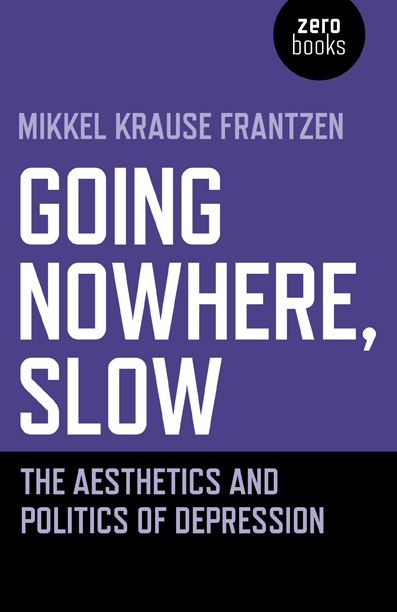Going Nowhere, Slow
An unique analysis of four cultural works of depression and what they say about our society and our time.

An unique analysis of four cultural works of depression and what they say about our society and our time.
An unique analysis of four cultural works of depression and what they say about our society and our time.
Art & politics, Comparative literature, Depression
Using examples from art and literature, Frantzen explores the social, political and economic implications of both real and imagined depression. Is feeling blue a symptom of the death of progress? Was the suicide of David Foster Wallace a proverbial canary in a coal mine?
Margaret Thatcher once declared that there is no alternative to the social order that we now reside within. Have we accepted her slogan as a fact, and is that why so many are on Prozac and other anti-depressants?
Frantzen examines the works of Michel Houellebecq, Claire Fontaine and David Foster Wallace as he seeks out an answer and a way to formulate a new future oriented left movement.
Click on the circles below to see more reviews
...............Going Nowhere, Slow is a compelling read for anyone interested in conceptualization and representations of depression, or the relation between contemporary culture and mental illness more generally. Frantzen’s writing is high-paced, erudite and at times humorous. Despite the subject matter, the author never romanticizes depression or succumbs to pessimism or fatalism. Instead, he uses the artworks discussed to establish a possible way out of the perceived dualism between escapism and maintaining the status quo. Whether it is Wallace’s insistence on empathy, Claire Fontaine’s call for collective action or Von Trier’s depiction of eschatological salvation, Frantzen’s message is that there is hope amidst hopelessness. Deeply critical and sharply written, Going Nowhere, Slow is an inspired and inspiring work. ~ Ward Huetink, Radboud University Nijmegen.
In this groundbreaking book, Mikkel Krause Frantzen takes depression as something that does not simply have connection with the subject’s past and alienation from others, but also to the idea of future and too much closeness. As a result, Frantzen finds in depression glimmers of optimism and hope. This book is essential reading for anyone who has questioned what depression is all about and why so many well-known novelists have created their best works trying to come to grips with it. ~ Renata Salecl, author of Tyranny of Choice
In this sharp and poetic book, Mikkel Krause Frantzen brilliantly illustrates the horror of depression. But he doesn’t leave us there, in despair, but opens up new hopeful ways of thinking about the spirit of our time. ~ Carl Cederström, author of The Happiness Fantasy, co-author of Dead Man Working
Why are we all so depressed? Today, depression is less an individual malady, than it is a structure of feeling that pervades Western neoliberal society. In this book, Mikkel Krause Frantzen digs deeply into this situation, reading a number of works (novels, movies, visual art) that not only give expression to our depressive condition, but offer clues as to why and how we feel this way. ~ Steven Shaviro, author of Connected, or What It Means to Live in the Network Society